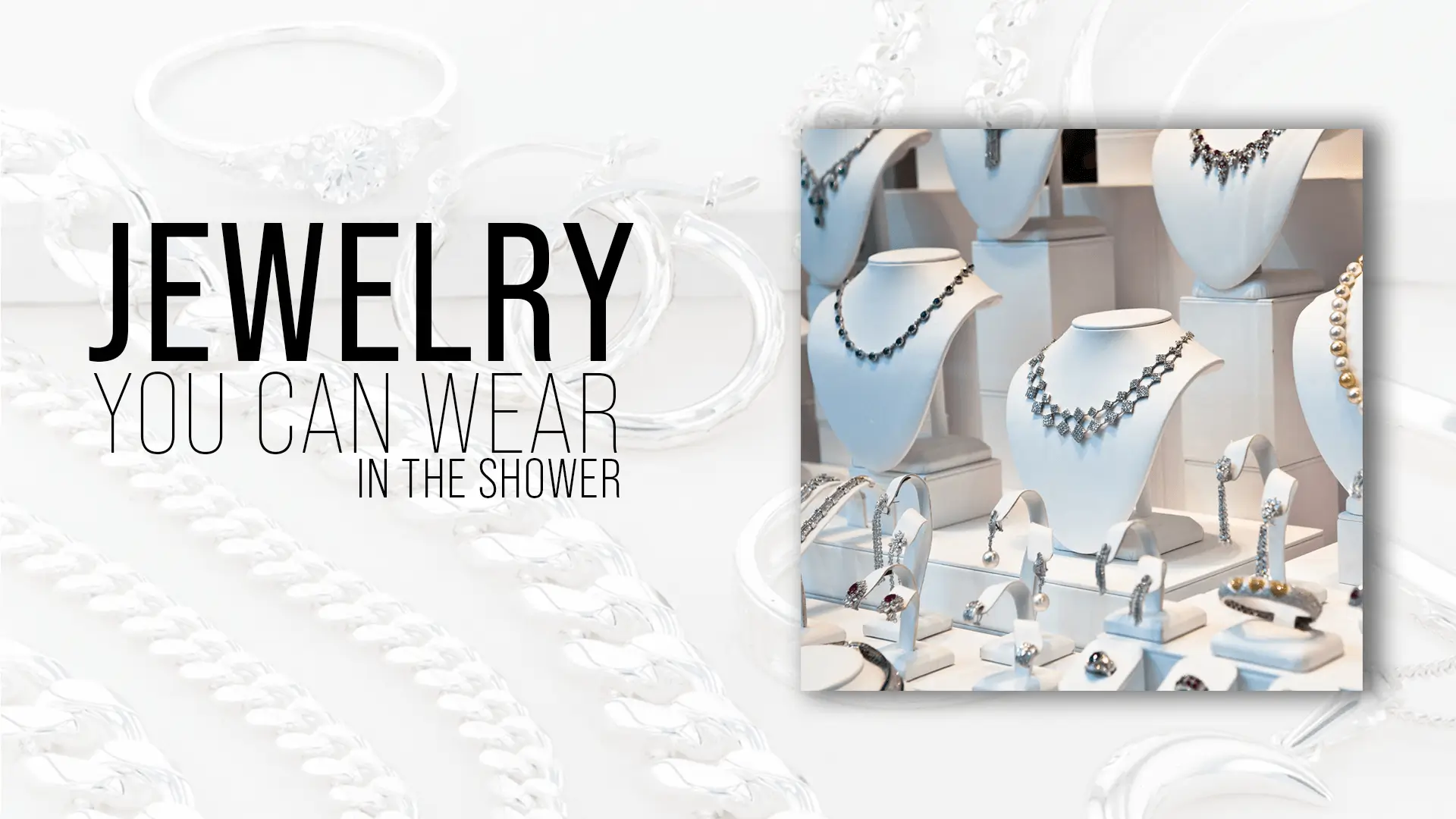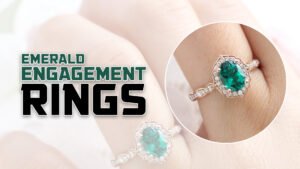Introduction
Everybody loves the shine and sparkle of jewellery, and we also understand that this shine will only disappear if you take proper care of your jewellery. In most cases, the reason behind their dullness is mostly water. Even though the best advice is always not to wear any kind of jewellery in the shower. In some cases, it is difficult to take off your jewellery and it becomes a hassle for you. You decide to keep it on and go for a bath as it is. But before doing, so you must consider the material of the jewellery first. Some materials are water resistant, while some other kinds of jewellery should be protected from water at any cost. So which material is safe and which is not in the shower? You will know all after reading this article.
Jewelry you can wear in the Shower
Stainless Steel Jewelry
It is not only used to make jewellery, but it has other uses, too, like kitchenware and surgical types of equipment. Typically, this alloy is made from a combination of iron, carbon, and chromium. Because it resists rust and corrosion, you can wear it in the shower without worrying that it will react or tarnish. The only drawback is that it may eventually turn discoloured due to chlorine, soap residue, and other substances in the water. Although it has iron, and this is prone to rust. People see it as a drawback, but due to the presence of chromium, it offers corrosion resistance. It is not an expensive material but keeps on shining even after exposing to water for a long time.
Solid Gold Jewelry
Gold is the most desirable and ancient material used to make jewellery. This one is one of the few valuable metals that won’t tarnish or rust over time. It won’t rust for a long time because it is non-reactive, so you may wear it in the shower without worrying about it rusting. Whether ordinary gold, white gold, or rose gold is safe in the shower. Another quality of gold is its natural inertness which means it doesn’t react with oxygen, so it doesn’t rust or tarnish. Yet with time, soap scum and shampoo residue cause it to lose its shine. Constant exposure to water will also cause the dullness of the jewellery. Also, avoid using it in pools, hot tubs or saunas, or any places with chemicals and high temperatures.
Platinum Jewelry
Another wonderful option for jewellery is platinum, which is silvery-white and more uncommon than gold. This precious metal won’t tarnish or react with water, much like gold. Platinum is unaffected by water, making it safe to use in the shower. Due to its high inertness, platinum is classified as a noble metal. Electronics, laboratories, and chemical processes all frequently employ it.
Even the most corrosive elements won’t be able to damage platinum jewellery, thanks to its extreme durability. But be careful that the chemicals in shampoo and soap can cause it to discolour over time. However, a patina might develop on the jewellery with a frosty look. But it is not a problem. Just take the jewellery to the jeweller, and he will polish it. After that, the jewellery will come back to its original shiny form. So platinum necklaces, rings, bracelets are the ones, you can wear in the shower.
Titanium Jewelry
Titanium is a versatile engineering material in various products, including jewellery and medical equipment. It is strong but also hypoallergenic and corrosion-resistant, so you may wear it in the shower without worrying. It also has some other qualities, such as durability and is much lighter than high-strength steel.
Aluminum Jewelry
Though it’s not valuable, aluminium is a light metal that won’t rust or react to water. It’s frequently used for accessories like earrings, bracelets, and necklaces that may be worn in the shower without worrying about rusting. It is used in making different kinds of pieces of jewellery. Because it doesn’t include iron or any other components that rust readily, it also won’t rust. Its surface is shielded by a millimetre or so of aluminium oxide, which stops the metal from reacting with water as a result, stops corrosion.
Glass Jewelry
Glass is used to create some jewellery items, including necklaces and earrings. When wearing these products in the shower, there is no need to worry about corrosion or tarnishing. But bear in mind that if subjected to abrupt temperature swings, Glass can crack or break, so you should always be careful. Silicon dioxide, a component of Glass, is arranged in a long, uninterrupted chain. Glass is not water-soluble due to this characteristic. It cannot be affected by water or lose its colour or design.
Plastic Jewelry
This synthetic material is incredibly robust and waterproof. Plastic jewellery is perfect for a shower because it won’t corrode or react in any way to the water. So it is waterproof and very resilient. The only drawback is that it may eventually turn discolored as a result of the chemicals, chlorine, and other substances found in water. This will affect the appearance and quality of your plastic jewellery.
Silicone Jewelry
Although it is plastic, silicone is more elastic. Rings, bracelets, and other accessories that must fit exactly on the body are worn with them. The substance is also water resistant, so water won’t cause it to corrode or otherwise react. It is an engineering material known for flexibility, low conductivity, and malleability. Making jewellery of silicone has become more common these days. It is also a soft material. There is a fear of discolouration, too, when exposed to water.
Acrylic Jewelry
It is a kind of engineering plastic known for its optical clarity, strength, and color variety, also used in jewelry. It also doesn’t get affected by water like glass and other plastics. However, like other plastics, you need to acrylic away from essential oils as they contain potent and volatile substances which could be dangerous for the material. So if you want to use your acrylic jewelry for a long time, keep it away from essential oils.
Tungsten Carbide Jewelry
It is an inorganic compound of carbon with a light gray surface. It is mostly used in making rings. Due to its inert nature, tungsten carbide doesn’t react to moisture or water. You can use it while taking a shower without worrying about tarnish.
Jewelry you can’t wear in the Shower
Even though some jewelry is water resistant, there are some pieces that you must take off before getting in the shower.
Sterling Silver Jewelry
It is an alloy that contains 92.5% silver and 7.5% other metals like copper or nickel. It won’t directly corrode in water, but if exposed to water repeatedly, will tarnish it, lending it a dull appearance. It happens because of the reaction of water with metal in an alloy other than silver.
Gold Plated Jewelry
While gold is okay to wear in the shower, a gold-plated case is the opposite. A thin layer of gold is typically applied to base metals like brass or copper to create gold-plated jewelry. Removing this sort of jewelry before taking a shower is advised because it is not water-resistant and can tarnish quickly.
Pearls Jewelry
Due to their fragility, pearls should never be exposed to water. They may lose their luster and even crack or turn discolored because of shampoo, soap, and water chemicals. So, removing any pearl jewelry before taking a shower is preferable.
Wood Jewelry
Wood makes a beautiful piece of jewelry, but it has some drawbacks. It is not resilient when repeatedly exposed to water. If subjected to water over an extended period, it may expand, turn discolored, or even crack. Removing wooden jewelry before a shower is better because wood is porous and can absorb bacteria and other substances.
Diamond Jewelry
Although diamonds are one of the hardest metals, we don’t have any issues with reactions with water. However, they are expensive too so they may fall out of the jewelry while taking a shower, so you need to take extra care of them. Always take off your diamond jewelry before taking a shower.
Final thoughts
Even though certain jewelry can be worn in the shower, it is still advisable to think about the piece’s design and materials before exposing it to water. Exposure to moisture or harsh chemicals found in soaps and shampoos can harm some metals and gemstones. Furthermore, wearing jewelry while taking a shower increases the chances that you may lose the jewelry or make it a defective piece. Before having a shower, it is best to take off any pricey or fragile jewelry to keep it in excellent condition.
So if you had this question in the mind, “what jewelry can you wear in the shower”. I’m pretty sure that you got your answer.





